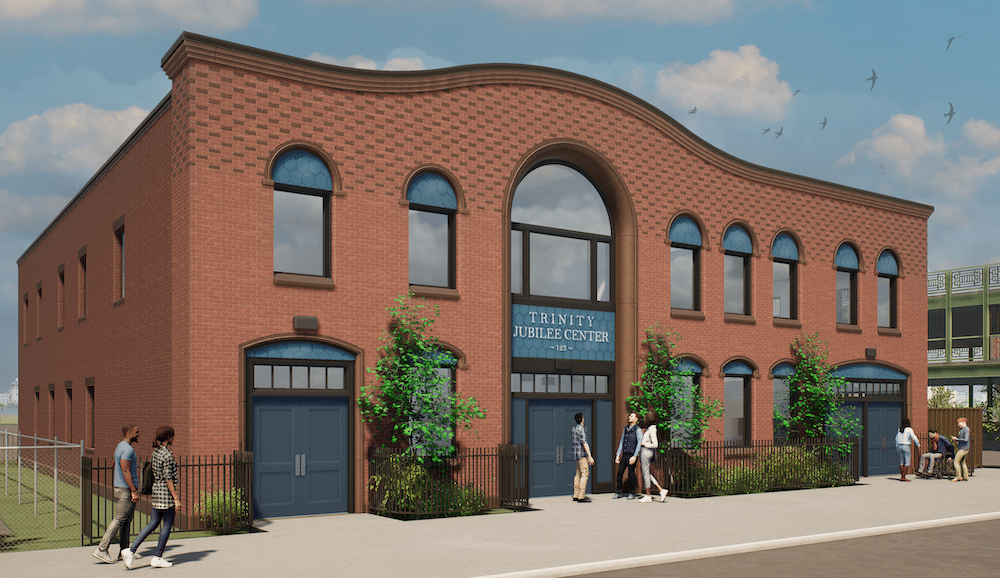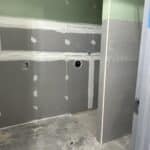
The Episcopal Church Executive Council recently approved more than $1 million in United Thank Offering grants supporting 27 innovative mission and ministry projects focused on water-related issues around the world. One of these grants—for $55,000—was received by the Episcopal Diocese of Maine to fund start-up costs for a new shower and laundry project for the Trinity Jubilee Center in Lewiston.
Since its inception in 1991, the Center has been housed in the undercroft of the historic, Gothic-Revival Trinity Episcopal Church building at the corner of Bates and Spruce streets in downtown Lewiston. From this cramped, poorly ventilated space which the Center rents from the church, it has nevertheless flourished in its mission to serve those in need, whose numbers continue to grow. Six days a week its soup kitchen serves a no-cost lunch to anyone who shows up—usually about 140 people per day, and a weekly food pantry provides groceries and diapers. It also offers a free medical clinic, an immigrant integration program, a day shelter, help with job applications, and other services to enable guests to become self-sufficient.
“It was a great space for a start-up, but we’ve vastly outgrown it,” says Executive Director Erin Reed, who was introduced to the Center in 2004 when she attended Bates College in Lewiston. “My freshman orientation group came here, and I kept coming. I would ride my bike down and wash dishes.”
Reed recently gave me a tour of the Center’s new facility under construction a few blocks away at 123 Bates St. At 10,000 square feet, the red brick-clad building will be nearly four times the size of the current space, and fully handicapped accessible, which the Center’s current home is not. Her enthusiasm for the opportunities the light-filled building presents is obvious as we walk from room to room. We start in the large food-distribution area, which will allow for easier load in of items from the Good Shepherd Food Bank and other sources, and for guests to wait to receive their boxes of food and supplies indoors; now they wait outside. A spacious lobby with a reception desk will also have a central workstation for guests to fill out paperwork—a big improvement from the current office, which is just 200 square feet. “Half the time you can’t get in and out because someone is sitting in front of the door,” says Reed. Behind the lobby is the shelter area with two sets of stackable washers and dryers, a kitchenette, and daylight—something the current shelter lacks—from four large windows along the back wall.
The laundry facilities and the bathroom with shower, one of four bathrooms in the building—including a public bathroom—are an especially significant upgrade for the Center, which currently has one restroom shared by shelter guests and one for staff. “Being able to shower and having clean clothes helps guests improve their dignity, health, and employability,” says Reed. The UTO grant provides the funding for a new staffer to oversee both the shower and laundry, and for guest safety, the shower will have a metered valve. “When you press it you get water for 30 seconds, so it really reduces the risk of someone overdosing in there and us not knowing,” she says.
The new building also includes a dedicated supply room with steel shelves and coat racks to make it easier for staff to receive and distribute winter jackets and boots; a commercial kitchen with walk-in refrigerator and freezer; and generously sized meeting rooms for mental health and substance abuse providers to work with guests. “We refer out to a lot of providers who would really like to come into the shelter,” Reed says. The second floor has more offices, a conference room with a wall of windows, and additional, flexible spaces that give the Center room to grow or the option to rent them out to other social service agencies.
Trinity Jubilee Center’s new home is expected to open in the late fall, with a ribbon cutting anticipated for early in 2026. Learn more about Trinity Jubilee Center here. Learn more about the UTO grants here.





